51.2.4.5 (51 > 60)
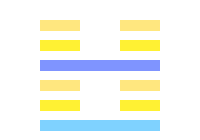
51.2.4.5 (51 > 60) - THE KĂN HEXAGRAM.
- 2. The second line, divided, shows its subject, when the movement approaches, in a position of peril. He judges it better to let go the articles (in his possession), and to ascend a very lofty height. There is no occasion for him to pursue after (the things he has let go) ; in seven days he will find them.
- 4. The fourth line, undivided, shows its subject, amid the startling movements, supinely sinking (deeper) in the mud.
- 5. The fifth line, divided, shows its subject going and coming amidst the startling movements (of the time), and always in peril ; but perhaps he will not incur loss, and find business (which he can accomplish).
51.2.4.5 (51 > 60) - Shock
One talks to another again after a long period of silence.
Bing DeepL Google Yandex51.2.4.5 (51 > 60) - Shock
One talks to another again after a long period of silence.
Bing DeepL Google Yandex51.2.4.5 (51 > 60) - Kán, l’ébranlement
Kán : tonnerre, effroi répandu, crainte.
- 2. Quand le tonnerre gronde, le danger arrive, on croit devoir tout abandonner et se retirer en un lieu sûr et élevé. Qu’on ne s’obstine pas à rechercher alors ce qu’on a abandonné ; on le retrouvera quelque temps après. (Quand le danger sera passé.)
- 4. Le tonnerre approchant trouble et interdit [avant même l’éclair].
- 5. Le tonnerre allant et venant répand l’effroi ; mais on doit tâcher de ne pas abandonner les affaires entreprises. Même dans le danger pressant, on doit garder le milieu.
51.2.4.5 (51 > 60) - Le choc
On se parle à nouveau après une longue période de silence.
Bing DeepL Google Yandex51.2.4.5 (51 > 60) - Megrázkódtatás
- 2. Ne keresse ami elveszett.
- 4. Meg kell szabadítania magát a többiektől mielőtt tovább mehetne.
- 5. Szilárdan áll a megrázkódtatás kezdetekor és végigkíséri a többieket míg véget nem ér.
The trigrams
The trigrams are combinations of three yin and yang lines. The three bottom lines of the hexagram form the lower trigram and represent the inner situation. The three top lines form the upper trigram and represent the outer situation.
Upper trigram: The thunder The water


Lower trigram: The thunder The lake


The formation: 51
What is already there
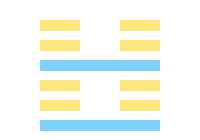
51 - THE KĂN HEXAGRAM.
Kăn gives the intimation of ease and development. When (the time of) movement (which it indicates) comes, (the subject of the hexagram) will be found looking out with apprehension, and yet smiling and talking cheerfully. When the movement (like a crash of thunder) terrifies all within a hundred lî, he will be (like the sincere worshipper) who is not (startled into) letting go his ladle and (cup of) sacrificial spirits.
Bing DeepL Google Yandex51 - Shock
Something is coming which enables the identification of a problem.
Bing DeepL Google Yandex51 - Shock
Something is coming which enables the identification of a problem.
Bing DeepL Google Yandex51 - Kán, l’ébranlement
Kán : tonnerre, effroi répandu, crainte.
Kán« tonnerre, effroi se répandant, appréhension ». Le tonnerre survenant répand l’effroi ; par l’effroi, les rires et les causeries s’arrêtent court. Le tonnerre terrifie cent lis, mais ne doit pas arrêter la cuiller du sacrifice aux esprits (le sacrifice) 1.
1 Le tonnerre peut arrêter tout mais pas empêcher le sacrifice.
Texte
Le tonnerre approchant répand l’effroi ; les rires, les causeries s’arrêtent subitement. Le tonnerre terrifie cent lis, mais ne doit pas arrêter la cuiller du sacrifice aux esprits.
Commentaire
Cet effroi a d’heureux résultats. Les rires et les causeries gardent ainsi la mesure. Le tonnerre terrifie ce qui est loin comme ce qui est près. Mais on doit, quand même, garder le temple des ancêtres, les autels des génies du sol et présider aux sacrifices. (Malgré l’effroi, on ne peut les interrompre.)
Symbolisme
Le tonnerre répété forme l’hexagramme. Le sage, plein de crainte et de scrupules prudents, observe et corrige.
51 - Megrázkódtatás
Valami közelít ami lehetővé teszi a probléma felismerését.
Bing DeepL Google Yandex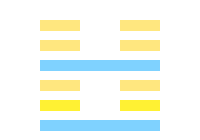
51.2 (51 > 54) - THE KĂN HEXAGRAM.
The second line, divided, shows its subject, when the movement approaches, in a position of peril. He judges it better to let go the articles (in his possession), and to ascend a very lofty height. There is no occasion for him to pursue after (the things he has let go) ; in seven days he will find them.
Bing DeepL Google Yandex51.2 (51 > 54) - Kán, l’ébranlement
Kán : tonnerre, effroi répandu, crainte.
Quand le tonnerre gronde, le danger arrive, on croit devoir tout abandonner et se retirer en un lieu sûr et élevé. Qu’on ne s’obstine pas à rechercher alors ce qu’on a abandonné ; on le retrouvera quelque temps après. (Quand le danger sera passé.)
Bing DeepL Google Yandex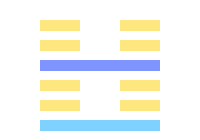
51.4 (51 > 24) - THE KĂN HEXAGRAM.
The fourth line, undivided, shows its subject, amid the startling movements, supinely sinking (deeper) in the mud.
Bing DeepL Google Yandex51.4 (51 > 24) - Being bogged down
One has to free oneself from others before one can go any further.
Bing DeepL Google Yandex51.4 (51 > 24) - Being bogged down
One has to free oneself from others before one can go any further.
Bing DeepL Google Yandex51.4 (51 > 24) - Kán, l’ébranlement
Kán : tonnerre, effroi répandu, crainte.
Le tonnerre approchant trouble et interdit [avant même l’éclair].
Bing DeepL Google Yandex51.4 (51 > 24) - Être embourbé
On doit se libérer des autres avant de pouvoir aller plus loin.
Bing DeepL Google Yandex51.4 (51 > 24) - Megrázkódtatás
Meg kell szabadítania magát a többiektől mielőtt tovább mehetne.
Bing DeepL Google Yandex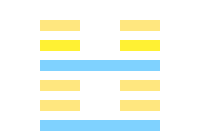
51.5 (51 > 17) - THE KĂN HEXAGRAM.
The fifth line, divided, shows its subject going and coming amidst the startling movements (of the time), and always in peril ; but perhaps he will not incur loss, and find business (which he can accomplish).
Bing DeepL Google Yandex51.5 (51 > 17) - Getting pushed around
One holds firm when the tremors begin, accompanies the others and endures them until they stop.
Bing DeepL Google Yandex51.5 (51 > 17) - Getting pushed around
One holds firm when the tremors begin, accompanies the others and endures them until they stop.
Bing DeepL Google Yandex51.5 (51 > 17) - Kán, l’ébranlement
Kán : tonnerre, effroi répandu, crainte.
Le tonnerre allant et venant répand l’effroi ; mais on doit tâcher de ne pas abandonner les affaires entreprises. Même dans le danger pressant, on doit garder le milieu.
Bing DeepL Google Yandex51.5 (51 > 17) - Se faire bousculer
On se tient fermement quand les secousses commencent, on accompagne les autres et on les endure jusqu'à ce qu'elles cessent.
Bing DeepL Google Yandex51.5 (51 > 17) - Megrázkódtatás
Szilárdan áll a megrázkódtatás kezdetekor és végigkíséri a többieket míg véget nem ér.
Bing DeepL Google YandexIn the making: 60
What is poised to happen

60 - THE KIEH HEXAGRAM.
Kieh intimates that (under its conditions) there will be progress and attainment. (But) if the regulations (which it prescribes) be severe and difficult, they cannot be permanent.
Bing DeepL Google Yandex60 - Tsieh, la délimitation
Tsieh : règle, loi, mesure.
Tsieh « règles, lois ». Les lois trop sévères ne peuvent se consolider et subsister. La sévérité doit tenir le juste milieu, ou sa force dépérit.
Texte
Les lois dures ne peuvent donner la prospérité.
Commentaire
Les lois trop sévères, dures, ne peuvent se consolider et subsister. La fermeté et la bonté doivent se partager également.
La sévérité doit tenir le juste milieu, ou sa force dépérit. La satisfaction fait affronter les périls. On doit administrer selon les règles et procéder avec modération et justice. Le ciel et la terre suivant leurs lois, les quatre saisons parfont leur cours. Si l’on observe en tout la mesure, on ne perdra pas les ressources publiques, on ne nuira pas au peuple.
Symbolisme
L’eau au-dessus d’un marais forme le Koua de tsieh, règle, mesure. Le grand et sage règle tout avec modération et apprécie les actes de vertu.
The nuclear hexagram: 39.1.3.5.6 (39 > 27)
The nuclear hexagram is the association of the two inner trigrams (lines 2,3,4 and 3,4,5). It represents the root, or the origin of the situation.
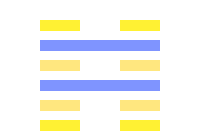
39.1.3.5.6 (39 > 27) - THE KIEN HEXAGRAM.
- 1. From the first line, divided, we learn that advance (on the part of its subject) will lead to (greater) difficulties, while remaining stationary will afford ground for praise.
- 3. The third line, undivided, shows its subject advancing, (but only) to (greater) difficulties. He remains stationary, and returns (to his former associates).
- 5. The fifth line, undivided, shows its subject struggling with the greatest difficulties, while friends are coming to help him.
- 6. The topmost line, divided, shows its subject going forward (only to increase) the difficulties, while his remaining stationary will be (productive of) great (merit). There will be good fortune, and it will be advantageous to meet with the great man.
39.1.3.5.6 (39 > 27) - Hearing only bits and pieces
One hopes having understood what others have said.
Bing DeepL Google Yandex39.1.3.5.6 (39 > 27) - Hearing only bits and pieces
One hopes having understood what others have said.
Bing DeepL Google Yandex39.1.3.5.6 (39 > 27) - Kién, l’obstacle
Kién : Difficulté, danger, noble hardiesse.
-
1. Si l’on va (courageusement) aux choses difficiles, on reviendra comblé de louanges.
Il convient d’être ferme. - 3. L’un va aux difficultés et revient après au repos. Ou : qui va aux difficultés (courageusement) revient aux profits (en obtient).
- 5. C’est dans les difficultés que les amis se montrent.
-
6. Un autre y va également et revient plus éclairé et intelligent.
Il a la juste mesure.
Un dernier y va de même et revient plein de mérite et de succès. Il atteint les qualités du grand homme.
39.1.3.5.6 (39 > 27) - N'entendre que des bribes
On espère avoir compris ce que les autres ont dit.
Bing DeepL Google Yandex39.1.3.5.6 (39 > 27) - Bizonytalanság
- 1. Mások ellenállnak mert nem ellenőrizte, így közvetítőt kér hogy felülvizsgálják a munkáját.
- 3. Azt akarják hogy visszajöjjön.
- 5. Problémák amiket nem oldhat meg egyedül, látogatókat kap amikor szükség van rájuk.
- 6. Kéri eltávolodott barátait hogy térjenek vissza.
Ruler
The starting situation

51.5 (51 > 17) - THE KĂN HEXAGRAM.
The fifth line, divided, shows its subject going and coming amidst the startling movements (of the time), and always in peril ; but perhaps he will not incur loss, and find business (which he can accomplish).
Bing DeepL Google Yandex51.5 (51 > 17) - Getting pushed around
One holds firm when the tremors begin, accompanies the others and endures them until they stop.
Bing DeepL Google Yandex51.5 (51 > 17) - Getting pushed around
One holds firm when the tremors begin, accompanies the others and endures them until they stop.
Bing DeepL Google Yandex51.5 (51 > 17) - Kán, l’ébranlement
Kán : tonnerre, effroi répandu, crainte.
Le tonnerre allant et venant répand l’effroi ; mais on doit tâcher de ne pas abandonner les affaires entreprises. Même dans le danger pressant, on doit garder le milieu.
Bing DeepL Google Yandex51.5 (51 > 17) - Se faire bousculer
On se tient fermement quand les secousses commencent, on accompagne les autres et on les endure jusqu'à ce qu'elles cessent.
Bing DeepL Google Yandex51.5 (51 > 17) - Megrázkódtatás
Szilárdan áll a megrázkódtatás kezdetekor és végigkíséri a többieket míg véget nem ér.
Bing DeepL Google YandexCorrection
The direction where the ruler is going to bend
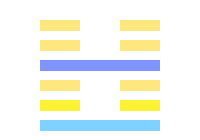
51.2.4 (51 > 19) - THE KĂN HEXAGRAM.
- 2. The second line, divided, shows its subject, when the movement approaches, in a position of peril. He judges it better to let go the articles (in his possession), and to ascend a very lofty height. There is no occasion for him to pursue after (the things he has let go) ; in seven days he will find them.
- 4. The fourth line, undivided, shows its subject, amid the startling movements, supinely sinking (deeper) in the mud.
51.2.4 (51 > 19) - Shock
One complains of a strange clumsiness that seemed to have been prepared beforehand.
Bing DeepL Google Yandex51.2.4 (51 > 19) - Shock
One complains of a strange clumsiness that seemed to have been prepared beforehand.
Bing DeepL Google Yandex51.2.4 (51 > 19) - Kán, l’ébranlement
Kán : tonnerre, effroi répandu, crainte.
- 2. Quand le tonnerre gronde, le danger arrive, on croit devoir tout abandonner et se retirer en un lieu sûr et élevé. Qu’on ne s’obstine pas à rechercher alors ce qu’on a abandonné ; on le retrouvera quelque temps après. (Quand le danger sera passé.)
- 4. Le tonnerre approchant trouble et interdit [avant même l’éclair].
51.2.4 (51 > 19) - Le choc
On se plaint d'une étrange maladresse qui semblait avoir été préparée à l'avance.
Bing DeepL Google Yandex51.2.4 (51 > 19) - Megrázkódtatás
- 2. Ne keresse ami elveszett.
- 4. Meg kell szabadítania magát a többiektől mielőtt tovább mehetne.

